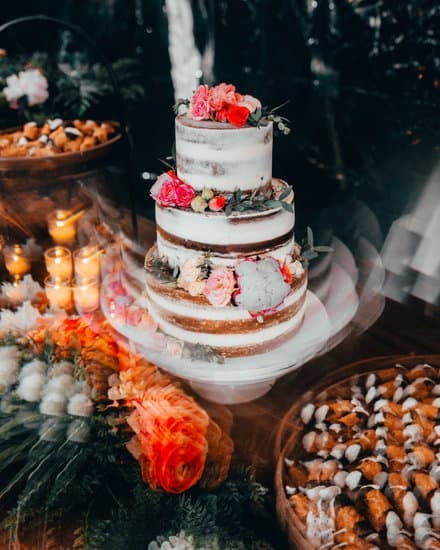Do you have to have wedding rings to get married? The tradition of exchanging wedding rings has long been a staple in marriage ceremonies, but the necessity of these bands is often debated. This article will delve into the significance of wedding rings, the history behind their use in marriage ceremonies, and whether they are legally required for a marriage to be valid.
The use of wedding rings dates back thousands of years and holds a symbolic significance in many cultures around the world. From ancient Egypt to medieval Europe, the exchange of rings has been a traditional part of wedding ceremonies, symbolizing love, commitment, and unity between partners. However, as society evolves and traditions shift, the question arises – are wedding rings truly necessary for a marriage to be legitimate?
In this article, we will explore both the traditional and modern views on wedding rings and marriage. We will also examine alternative symbols of commitment that couples may choose over traditional wedding bands. Additionally, we will discuss the legal requirements for marriage and whether or not wedding rings are necessary for a marriage to be officially recognized. Let’s dive in and explore the various perspectives on this age-old tradition.
The History of Wedding Rings and Their Significance in Marriage Ceremonies
Wedding rings have a long and rich history, dating back thousands of years to ancient Egypt and Rome. These early civilizations believed that the circle symbolized eternity and the unending love and commitment between a married couple. The tradition of exchanging rings during marriage ceremonies has continued throughout history, with different cultures adding their own unique customs and meanings to the practice.
Symbolism and Meaning
The circular shape of wedding rings represents an unbroken bond, with no beginning or end, while the precious metal signifies the value and durability of the relationship. Additionally, the placement of the ring on the fourth finger of the left hand is said to be connected to a vein that leads directly to the heart, further emphasizing the emotional significance of this tradition.
Historical Context
In medieval Europe, wedding rings were often used as part of legal contracts between families or as symbols of ownership. However, over time, they came to be seen as expressions of love and commitment between partners. Today, in many Western cultures, exchanging wedding rings is an essential part of traditional marriage ceremonies.
Global Traditions
While Western cultures typically use rings as a symbol of marriage, other societies have their own unique customs for representing this commitment. For example, in some parts of India, couples exchange garlands made from flowers during their wedding ceremony.
In China, a pair of red strings may be tied around the wrists of bride and groom to signify their union. These diverse practices highlight that there are many ways to symbolize love and commitment in marriage without relying on wedding rings.
Traditional vs Modern Views on Wedding Rings and Marriage
When it comes to wedding traditions, the significance of wedding rings has evolved over time. In traditional views, wedding rings are seen as an essential symbol of commitment and love between two people. The exchange of rings during a marriage ceremony is often considered a sacred ritual that symbolizes unity and the promise to stand by each other through thick and thin.
However, in modern times, there has been a shift in perspective regarding the necessity of wedding rings in marriage. Some individuals may question whether it is absolutely essential to have wedding rings in order to get married. This shift can be attributed to changing societal norms and personal beliefs about the significance of material symbols in relationships.
Changing Attitudes
In today’s society, more couples are choosing to forgo traditional wedding customs, including the exchange of rings, in favor of unique expressions of their commitment. This may include personalized vows, symbolic rituals, or alternative forms of jewelry as a token of their union. As attitudes continue to shift, the idea that wedding rings are mandatory for marriage is being challenged.
The Personal Decision
Ultimately, the decision to have wedding rings as part of a marriage ceremony is deeply personal. While some couples may uphold the tradition and sentimental value of exchanging rings, others may find different ways to express their love and commitment without adhering to traditional practices. It is important for individuals to consider what holds true significance for them and their partner when deciding on the role of wedding rings in their marriage journey.
As society continues to evolve, so too do our perceptions of marriage and the symbols associated with it. Whether or not one chooses to have wedding rings as part of their marital vows is ultimately a reflection of personal values and beliefs regarding love and commitment.
Legal Requirements for Marriage and the Necessity of Wedding Rings
When it comes to legal requirements for marriage, the necessity of wedding rings is often a topic of confusion and debate. In many cultures, wedding rings are seen as an essential part of the marriage ceremony, symbolizing the commitment and love between partners. However, from a legal standpoint, the presence of wedding rings is not actually required to solemnize a marriage.
In fact, in most jurisdictions, the only legal requirement for marriage is obtaining a marriage license from the local government authority. This means that couples are not obligated to exchange wedding rings during their marriage ceremony. The act of exchanging rings is purely symbolic and holds no legal significance in terms of the validity of the marriage itself.
Despite this legal perspective, wedding rings are deeply ingrained in many cultural and religious traditions surrounding marriage. For some couples, the exchange of rings serves as an important ritual that symbolizes their commitment to each other. As such, while not legally required, in many cases, having wedding rings has personal and emotional significance for those getting married.
- Receiving a marriage license from local government
- The exchange of rings is purely symbolic
- Wedding rings hold personal and emotional significance
Alternative Symbols of Marriage and Commitment
While wedding rings have long been the traditional symbol of marriage and commitment, many couples are now choosing alternative symbols to represent their union. One popular trend is opting for matching tattoos instead of wedding rings. These tattoos can range from simple bands on the ring finger to more elaborate designs that hold personal significance for the couple.
Another alternative to wedding rings is the use of promise or commitment jewelry. This can include bracelets, necklaces, or even customized items that serve as a reminder of the couple’s commitment to each other. Some couples may also choose to exchange meaningful items, such as heirlooms or personalized gifts, as a symbol of their love and devotion.
It’s important to note that there are no legal requirements stating that wedding rings are necessary for a marriage to be valid. In fact, in some cultures and traditions, the exchange of rings may not be a part of the marriage ceremony at all. The emphasis on wedding rings as a symbol of marriage is a modern tradition rather than a legal requirement.
| Alternative Symbols | Description |
|---|---|
| Tattoos | Some couples opt for matching tattoos on their ring fingers as a symbol of their union. |
| Promise Jewelry | Bracelets, necklaces, and customized items serve as reminders of commitment. |
| Meaningful Gifts | Couples might exchange heirlooms or personalized items as symbols of their love and devotion. |
Cultural Perspectives on Wedding Rings and Marriage
Wedding rings hold a significant cultural significance in many societies around the world. The cultural perspective on wedding rings and marriage varies widely, with some cultures placing great importance on the exchange of rings during the marriage ceremony, while others may not prioritize this tradition as much. Here are some cultural perspectives on wedding rings and marriage:
- In Western cultures, the exchange of wedding rings is a widely practiced tradition that symbolizes the commitment and eternal love between the couple. It is believed that the circular shape of the ring represents eternity and the never-ending bond between husband and wife.
- In traditional Japanese weddings, there is no exchange of wedding rings. Instead, a ceremonial exchange of sake cups known as “san-san-kudo” is performed to symbolize the union of two families. This demonstrates that different cultures have their own unique ways of symbolizing marriage and commitment.
- In Indian culture, the bride and groom typically exchange wedding rings during their marriage ceremony, similar to Western traditions. However, in some parts of India, other symbols such as toe-rings or colorful threads are also exchanged to signify the marital bond.
The cultural perspective on wedding rings and marriage highlights the diversity of traditions around the world. While wedding rings may be an important symbol in certain cultures, it’s important to recognize that there are alternative symbols and perspectives on marriage that hold equal significance.
Ultimately, the decision to have wedding rings as part of a marriage ceremony is deeply personal and depends on individual beliefs, cultural background, and customs. Whether it’s exchanging rings or other meaningful symbols, what truly matters is the commitment and love shared between partners.
The Personal Significance of Wedding Rings in Marriage
For many couples, the exchange of wedding rings is a deeply meaningful and cherished tradition. The wedding ring symbolizes eternal love, commitment, and the promise of a lifetime together. It serves as a daily reminder of the vows taken on the wedding day and represents the unbreakable bond between partners.
While not all couples choose to wear a wedding ring, for those who do, it holds immense sentimental value. Many individuals feel that wearing a wedding ring signifies their status as a married person and provides a sense of security and stability in their relationship. The act of exchanging rings during the marriage ceremony also creates a lasting memory for both partners, further strengthening their emotional connection.
In addition to its symbolic meaning, the wedding ring often carries personal significance for each individual. It may be passed down through generations as an heirloom or custom-designed to reflect the unique style and personality of the wearer. Ultimately, the personal significance of wedding rings lies in the emotions and memories attached to this cherished piece of jewelry.
| Personal Significance | Wedding Rings |
|---|---|
| Symbolizes eternal love and commitment | Provides sense of security and stability |
| Creates lasting memories for both partners | Holds sentimental value for each individual |
Conclusion
In conclusion, the tradition of wedding rings has a rich history and significance in marriage ceremonies, but it is not an absolute requirement to have wedding rings to get married. The legal requirements for marriage do not include the necessity of wedding rings, and there are alternative symbols of marriage and commitment that couples can choose to embrace.
While traditional views may emphasize the importance of wedding rings, modern perspectives on marriage allow for more flexibility and personalization in expressing commitment.
Cultural perspectives also play a role in the significance of wedding rings, with different cultures having varying traditions and symbols associated with marriage. It is important to recognize and respect these differences, while also understanding that the personal significance of wedding rings in marriage can vary for each individual and couple.
Ultimately, the true meaning of marriage extends beyond material symbols such as wedding rings. While they can hold sentimental value and be powerful symbols of commitment for many couples, they are not a mandatory component of a meaningful and loving partnership.
What truly matters is the love, trust, and mutual respect between partners, regardless of whether or not they choose to exchange wedding rings. Marriage is about the bond between two people, not about the physical objects they wear on their fingers.
Frequently Asked Questions
Is It OK to Get Married Without a Ring?
Getting married without a ring is absolutely okay. The decision to get married should be based on love, commitment, and compatibility rather than material possessions. A ring is just a symbol.
Do You Have to Give a Ring to Get Married?
Traditionally, giving a ring is a common symbol of commitment and love in marriage. However, it is not a requirement to get married. Some couples may choose alternative symbols or simply verbalize their commitment.
Is It Bad Not to Have Wedding Ring?
It is not inherently bad to not have a wedding ring. Ultimately, the importance of the wedding ring lies in the meaning and significance that the couple attributes to it. What matters most is the strength of the relationship behind the ring.

I have been involved in marriages for over 20 years helping couples and singles understand more about them.





